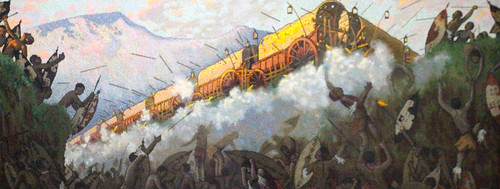The Voortrekker Monument in Pretoria, South Africa. This monument is viewed as an architectural wonder by many. Yet, it has a troubling legacy in South Africa, as it honors the Boer victory over Dingaan at the Battle of Blood River, and the Vow that those Boers took, effectively proclaiming the land to belong to the Boer people (now known as the Afrikaners). It was built during the early days of apartheid rule. I took this picture during my visit to the monument in September of 2024.
Today is a national holiday in South Africa, known as the Day of Reconciliation. It was officially designated a holiday in 1994, when the first post-apartheid, black majority government took power following decades of white-minority rule and the official, racist policies of the apartheid government.
Prior to that, the day had been a holiday known as "The Day of the Covenenant" (at least to Afrikaners, and was also known sometimes as "Dingaan's Day"), and commemorated the Battle of Blood River, when roughly four hundred Boers, who had moved inland during the Great Trek, prepared for a battle against somewhere between 16,000 to 30,000 of Dingaan's fierce Zulu warriors. The Boers literally circled their wagons to form an impregnable fortress with no weaknesses, and then fought off thousands of advancing Zulu warriors. So many Zulus were killed on that day, that the waters of the nearby Umslatos River were colored red from the blood of those killed and injured.

Photo courtesy of Nagarjun Kandukuru's Flickr page - Zulus v Afrikaaners: https://www.flickr.com/photos/nagarjun/18186517093/in/photolist-tH5DVx-unttze-6TPaGe-zbkGg7-zsWsLH-zbqsGe-ztNwmK-zrS8XG-zsWkmT-zbjgx3-zbqiGa-zbjd5w-zbkpCC-yvUvrq-zsW9wr-ztNfpz-yw3ENV-uDtPdj-uE9XRc-unk9VW-uE9Urr-uE9S8t-uDVvkg-uBAL7w-bKF5Wi-6cwRS1-bKF64K-i9gMA8-dM6Fps-3dpwtB-dM6Fu5-bwLnwy-dM6Ft1-dM17MB-dM17LP-2Uhw5q-2Ud8QT-2Ud8nx-2Uhv9C-2UhuHw-6csMFD-uDywFG-tGZhFQ-uBFuGd-tGZ6nh-unpygA-uBFbA3-unpFdy-uDxSeG-unpc9f
Creative Commons License: https://creativecommons.org/licenses/by/2.0/
The Zulus retreated, and the Boers had won, avenging an act of deceit by Dingaan, when he had not long before invited Boer leaders into his camp, and then murdered them while there. They were wary of this act by Dingaan, and Boer General Jan Gerritze Bantjes, knowing how badly outnumbered his group was, wrote before the battle that, should the Boers be granted victory by God, that the day should be honored and celebrated as a symbol that the Boers (Afrikaners) had been given a covenant by God himself to rule over this land (South Africa):
"Day of The Vow or Covenant" that "if the Lord might give us victory, we hereby deem to found a house as a memorial of his Great Name at a place where it shall please Him, and that they also implore the help and assistance of God in accomplishing this Vow and that they write down this Day of Victory in a book and disclose this event to our very last posterities in order that this will forever be celebrated in the honour of God."
With that covenant, the Afrikaners began to feel that God had given them this country to rule over. When they obtained political rule over it following the election of 1948, they established a rigid set of laws, famously known as apartheid, that set up a legally binding racial caste system. This system was challenged many times, but remained in place until the 1990's. Some people suggest that apartheid ended in 1990, when Prime Minister FW DeKlerk announced that apartheid as a system had failed and reforms would be instituted, and that all political organizations that had formerly been banned would be legalized. Most famously, he released Nelson Mandela. But legal segregation remained for some time afterwards, and I remember reading once that beaches in popular tourist resorts remained segregated even as recently as 1992 and 1993. Ultimately, it was in 1994 that a black majority government elected in a multiracial election first took power, and that legalized racism was finally banished in South Africa.
Since then, life has hardly been a paradise in South Africa. They face enormous problems. The AIDS crisis spiraled out of control, government officials have been found to be blatantly, outrageously corrupt, and economic inequality, still in great part based on race, has been flow to be addressed. Millions of homes were given running water, heat, and electricity after 1994, but there are still millions of homes that still lack these basic essentials.
Still, the police no longer raid communities in overnight raids searching for people who do not have their pass books in order, and opportunities within the country are no longer limited officially by race. The nation addressed past crimes and excesses by instituting the Truth and Reconciliation Commission, where dirty laundry was aired publicly, but it allowed the country to confront this dark past and come to terms with it. You cannot move forward if you are always looking back, and the country seems to have moved forward as a whole.
Perhaps it is not the glowing success story that some seemed to suggest shortly after Mandela took power, but South Africa was able to eliminate apartheid in an admirable way. That, I believe, is what the Day of Reconciliation is all about, and so on this day, I honor it.

No comments:
Post a Comment